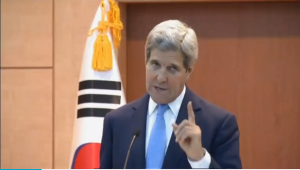
MAY 18 (Reuters) — U.S. Secretary of State John Kerry said on Monday (May 18) North Korea has “not even come close” to taking the steps needed to rein in its nuclear weapons programme to initiate talks, adding the United States was considering further sanctions.
Speaking in the South Korean capital, Kerry said Washington continued to offer the isolated North the chance for an improved relationship in return for signs of a genuine willingness to end its nuclear programme.
“The United States continues to offer Pyongyang an improved bilateral relationship if and only if, and when, it demonstrates a genuine willingness to fulfill its denuclearisation obligations and commitments, and when it shows a willingness to address other important concerns shared by the international community. To date, to this moment, particularly with its recent provocations, it is clear that the DPRK (Democratic People’s Republic of Korea) has not even come close to meeting that standard. Instead, it continues to pursue nuclear weapons and ballistic missiles, it continues to break promises and make threats, and it continues to show flagrant disregard for international law while denying its own people the protection of fundamental freedoms and human rights,” Kerry told a joint news conference with South Korean Foreign Minister Yun Byung-se.
DPRK are the initials of the North’s official name, the Democratic People’s Republic of Korea. North Korea is already under heavy U.S. and UN sanctions for its missile and nuclear tests.
Kerry said it was likely that the North would be referred to the International Criminal Court if its current behaviour on human rights continues.
“And it is also why for the first time, the UN Security Council last year took up the question of a referral of North Korea, and particularly Kim Jong Un’s behaviour, to the International Criminal Court. And if horrific conduct continues, it is hard to see how that referral to the Criminal Court would not take place. Their behaviour is against all notions of conscience, all standards of behaviour, anywhere in the world. It is among the very worst,” he said.
Kerry added that the U.S was considering further sanctions.
Pyongyang walked away from a 2005 deal with the United States, Russia, South Korea, and China to end its nuclear programme in return for diplomatic and economic rewards.
The North recently tested what it said was a submarine-launched ballistic missile, raising regional tensions about the prospect of a heightened threat that already includes nuclear arms development and an arsenal of ballistic missiles.
North Korea is technically still at war with the South after the 1950-53 conflict ended in a truce, not a peace treaty, and regularly threatens to destroy the South’s major ally, the United States.








